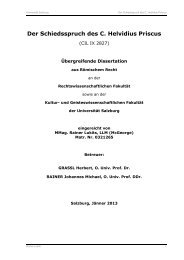equivalent effect an expansive reading and listed 19 types of prohibited rules andpractises. All <strong>the</strong>se fac<strong>to</strong>rs influenced <strong>the</strong> Court in taking quasi-legislative acti<strong>on</strong>,becoming itself <strong>the</strong> driving force for <strong>the</strong> building of a comm<strong>on</strong> market. 18 The mostimportant c<strong>on</strong>sequence of Dass<strong>on</strong>ville and following cases was that <strong>the</strong> Court empowered<strong>the</strong> main interest group for removing trade barriers, <strong>the</strong> European traders and producers, <strong>to</strong>challenge nati<strong>on</strong>al legislati<strong>on</strong>. 19 Therefore, <strong>the</strong> pressure was <strong>on</strong> <strong>the</strong> Member States <strong>to</strong>justify legislati<strong>on</strong> c<strong>on</strong>trary <strong>to</strong> Art 34 TFEU.1.2 Limitati<strong>on</strong> by <str<strong>on</strong>g>Keck</str<strong>on</strong>g>The Court’s case law c<strong>on</strong>stituted a great incentive <strong>to</strong> move <strong>to</strong>wards a comm<strong>on</strong> market, but<strong>the</strong> breadth of <strong>the</strong> Dass<strong>on</strong>ville-formula turned out <strong>to</strong> be a double-edged sword. Theformula, which did not seem <strong>to</strong> provide limits <strong>to</strong> judicial review, was increasingly used asan instrument <strong>to</strong> attack any nati<strong>on</strong>al legislati<strong>on</strong> which s<strong>to</strong>od in <strong>the</strong> way of free trade – like<strong>the</strong> famous Sunday trading cases show 20 – and this led <strong>to</strong> an overload of cases. Moreover,nati<strong>on</strong>al courts clearly signalled <strong>the</strong>ir disagreement with <strong>the</strong> lack of sensible limits andguidelines by simply not applying <strong>the</strong> formula. 21 Finally, <strong>the</strong> Court faced heavy criticism18St<strong>on</strong>e Sweet, Judicial C<strong>on</strong>structi<strong>on</strong>, pp. 133 f; see also Maduro, “Reforming <strong>the</strong> Market or <strong>the</strong> State?Article 30 and <strong>the</strong> European C<strong>on</strong>stituti<strong>on</strong>: Ec<strong>on</strong>omic <strong>Freedom</strong> and Political Rights”, 3(1) ELJ (1997),55, at 59.19For <strong>the</strong> direct effect see <str<strong>on</strong>g>Case</str<strong>on</strong>g> 74/76, Iannelli & Volpi v. Mer<strong>on</strong>i, [1977] ECR 557.20See <str<strong>on</strong>g>Case</str<strong>on</strong>g>s C-145/88, Torfaen, [1989] ECR 3851 and C-169/91, S<strong>to</strong>ke-<strong>on</strong>-Trent, [1992] ECR I-6635; for<strong>the</strong> academic discussi<strong>on</strong> see for example Barnard, “Sunday Trading: A Drama in Five Acts”, 57(3)MLR (1994), 449; Micklitz, The Politics of Judicial Co-operati<strong>on</strong> in <strong>the</strong> EU (CUP, 2005), pp. 43 ff.21See Jarvis, The Applicati<strong>on</strong> of EC <str<strong>on</strong>g>Law</str<strong>on</strong>g> by Nati<strong>on</strong>al Courts – The free movement of Goods (OUP, 1998),pp. 439 ff; St<strong>on</strong>e Sweet, Judicial C<strong>on</strong>structi<strong>on</strong>, p. 140; see <strong>to</strong> <strong>the</strong>se developments also Maduro in6
in academic literature. 22 These developments led <strong>to</strong> <strong>the</strong> important <str<strong>on</strong>g>Keck</str<strong>on</strong>g> 23 decisi<strong>on</strong> in 1993.In this decisi<strong>on</strong> <strong>the</strong> Court limited <strong>the</strong> scope of judicial review regarding indistinctlyapplicable measures by adopting a differentiati<strong>on</strong> suggested by academics. 24 Thedifferentiati<strong>on</strong> was made between product requirements <strong>on</strong> <strong>the</strong> <strong>on</strong>e hand, which regulate<strong>the</strong> compositi<strong>on</strong>, packaging or presentati<strong>on</strong> of a product, and certain selling requirements<strong>on</strong> <strong>the</strong> o<strong>the</strong>r, which <strong>on</strong>ly regulate <strong>the</strong> place, time and manner of selling products.According <strong>to</strong> <strong>the</strong> Court, product requirements are always c<strong>on</strong>sidered <strong>to</strong> have equivalenteffect <strong>to</strong> a quantitative restricti<strong>on</strong> <strong>on</strong> trade, because <strong>the</strong>y put a double burden <strong>on</strong> foreignproducts which already had <strong>to</strong> comply with <strong>the</strong>ir nati<strong>on</strong>al requirements. 25 In c<strong>on</strong>trast,certain selling arrangements do not fall within <strong>the</strong> scope of Art 34 TFEU, provided thatthose provisi<strong>on</strong>s apply <strong>to</strong> all affected traders operating within <strong>the</strong> nati<strong>on</strong>al terri<strong>to</strong>ry andprovided that <strong>the</strong>y affect in <strong>the</strong> same manner, in law and in fact, <strong>the</strong> marketing of domesticproducts and those from o<strong>the</strong>r Member States. This is because <strong>the</strong>y do not prevent <strong>the</strong>access of foreign goods <strong>to</strong> <strong>the</strong> market or impede <strong>the</strong> access of foreign goods more than<strong>the</strong>y impede <strong>the</strong> access of domestic products. With <str<strong>on</strong>g>Keck</str<strong>on</strong>g> <strong>the</strong> Court moved <strong>on</strong> from itsapproach in Dass<strong>on</strong>ville and decided that, whereas <strong>the</strong> producing State is resp<strong>on</strong>sible forAndenas/Roth, pp. 51 ff.22For an overview see Micklitz, Judicial Co-operati<strong>on</strong>, pp. 154 ff.23Joined <str<strong>on</strong>g>Case</str<strong>on</strong>g>s C-267 & 268/91, <str<strong>on</strong>g>Keck</str<strong>on</strong>g>, [1993] ECR I-6097, paras. 16 and 17.24White, “In <strong>the</strong> Search of <strong>the</strong> Limits <strong>to</strong> Articles 30 of <strong>the</strong> EEC Treaty”, 26 CML Rev. (1989), 235 andMorteknabbs, “Article 30 of <strong>the</strong> EEC Treaty and Legislati<strong>on</strong> Relating <strong>to</strong> Market Circumstances: Time<strong>to</strong> C<strong>on</strong>sider a New Definiti<strong>on</strong>”, 28 CML Rev. (1991), 115.25See for example Maduro, 3(1) ELJ (1997), 59.7
- Page 1 and 2: The Influence of the (post<
- Page 3 and 4: A. IntroductionRestrictions of the
- Page 5 and 6: criteria. Finally, it will be demon
- Page 7: mandatory requirements, also known
- Page 11 and 12: find a breach of Art 34 TFEU. Altho
- Page 13 and 14: appropriate restriction test is the
- Page 15 and 16: products. Consumers were more likel
- Page 17 and 18: principle of mutual recognition est
- Page 19 and 20: product. However, this argument is
- Page 21 and 22: to the Court those are: first, meas
- Page 23 and 24: context of very specific use restri
- Page 25 and 26: that the Court followed a de minimi
- Page 27 and 28: encourage the unhindered pursuit of
- Page 29 and 30: At first sight, it seems that the C
- Page 31 and 32: understood. It includes lotteries 8
- Page 33 and 34: meaning of the case law is not enti
- Page 35 and 36: A.G. Jacobs in his opinion in Säge
- Page 37 and 38: In its case law 112 the Court clari
- Page 39 and 40: As already shown above, the Court f
- Page 41 and 42: establishment does so even more. 12
- Page 43 and 44: itself. 135 This equals a product r
- Page 45 and 46: services. 141With regard to service
- Page 47 and 48: 3.1 Service RequirementsAdditional
- Page 49 and 50: equivalent to “certain selling ar
- Page 51 and 52: of goods, it will also have to limi
- Page 53 and 54: marketing method, because it only a
- Page 55 and 56: selling arrangements. 173In Delièg
- Page 57 and 58: Directive. 180 Art 4 (1) of the Dir
- Page 59 and 60:
services will face similar difficul
- Page 61 and 62:
However, such difficulties in findi
- Page 63 and 64:
outside the scope of Art 56 TFEU. T
- Page 65 and 66:
• Case C-169/91,
- Page 67 and 68:
• Joined Cases C
- Page 69 and 70:
Media, [2008] ECR I-5785• <strong
- Page 71 and 72:
• M. P. Maduro, “The Saga of Ar
- Page 73 and 74:
Case Notes• G. C
- Page 75:
Written work that has been submitte




